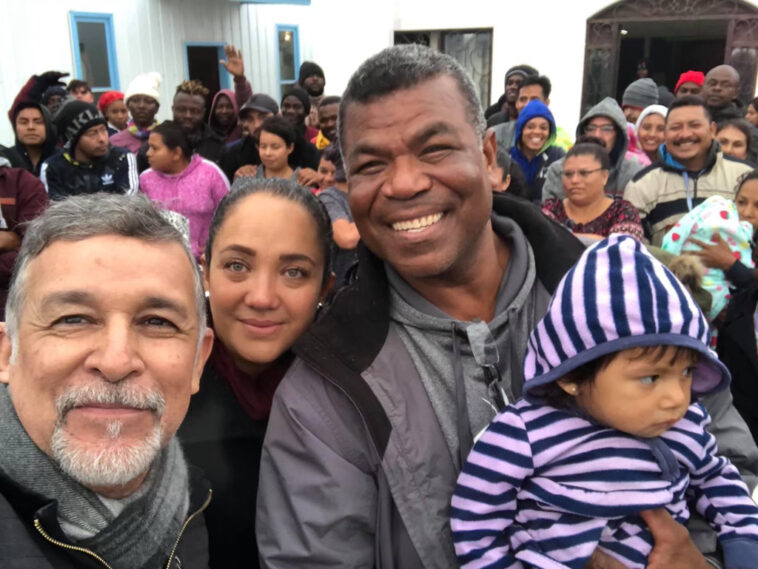For 24 years, Pastor Hector Silva has been running a shelter home for refugees in Mexico who are seeking asylum or work in the United States.
It was built to hold 150 people, but it often holds hundreds more than its limit, he said.
As refugees and migrants flee their countries in hope of finding refuge and work in the U.S., they face a difficult and dangerous journey.
As part of his ministry, he gives people fleeing their home countries a place to stay and hear the Gospel.
Right now, the 12,916 square foot shelter holds 540 people, Silva said.
Thirty-five of its current residents are children.
Most of the shelter’s residents are from Spanish-speaking countries including Venezuela, Mexico, Honduras, Guatemala, Nicaragua, and Cuba, he said.
Others come from as far away as Uganda, Cameroon, Sierra Leone and Ghana. Most want to enter the U.S.
A majority of people who’ve sought refuge at the shelter speak Spanish, Silva added. For those who don’t speak Spanish, Senda de Vida employs a translator.
While people stay at the shelter, Silva provides them with food, medicine, access to technology and child education, he said.
“Some time ago, we had 1,000 people. We would get overfilled. At 500, we’re kind of full. At 150, we’re all right with it,” he said.
“At first it took a lot of patience to understand all the different cultures [in one place]. With compassion, we worked to understand each other.”
COVID-19 has made the plight of refugees even more difficult and has presented the ministry with new challenges, Silva said. Due to COVID-19, like many other countries, the U.S. closed its borders.
Currently, 1,000 people who have stayed at Casa del Emigrante are waiting in Mexico to find out their U.S. immigration status.
People waiting for immigration courts to decide their cases are facing the longest immigration court backlog in history, due to the surge in new filings which reached 1,281,586 cases at the end of November, according to Border Report.
For the average immigrant, getting a court decision on an immigration case now takes around 500 days.
Silva said he was unsure whether most people who’ve taken refuge at Senda de Vida Casa del Emigrante, were looking for asylum as refugees in the U.S. or seeking some other type of legal status.
His ministry helps people who’ve applied to enter the U.S. legally and helps families find places to live in Mexico, he added.
Immigrants can apply for a visa to lawfully enter the U.S. if they have a job waiting for them in the U.S., are related to an American resident, win a green card lottery by coming from a country with low U.S. immigration rates, or if they are seeking asylum from violence, among other categories.
The average stay at Senda de Vida before COVID-19 was three to six months, Silva said.
To get to the U.S., people fleeing their home countries often pay cartels to transport them north. Doing so can be dangerous.
“People that pay to travel to the U.S. face danger,” said Silva.
“People can be killed. Many of them are imprisoned for ransom by cartels when they get to North America. When they enter our shelter, we have seen that they face many dangers. We put them in the hands of immigration groups that can protect them.”
Recently, the number of people traveling north has increased, he said. In this wave of immigration, there are also more children than usual.
Immigration rates from Spanish-speaking countries correlate with events in U.S. politics, said Silva.
After Joe Biden won the 2020 presidential election, many people hoping to cross the border illegally believe the U.S. government will not send them back to their home countries.
“They are more confident that the government will not send them back,” he said. “I don’t really know, but that’s what they think. It’ll be better, they think.”
Silva said he also thinks the chance that more Latin Americans will be allowed to enter and stay in the U.S. will improve because of Biden’s election.
“It’s what I’m thinking too. I’m also thinking that they’re going to get an improvement to the way they enter the U.S. There’s going to be lots of change,” he said.
The number immigrants who are illegally entering the U.S. has substantially increased since the fall. In October and November 2020, U.S. Border Patrol apprehended 140,591 people.
This represents the highest number of illegal immigrants found crossing the border in the last eight years, and almost 21,000 more than the average number for these two months.
In most years, illegal immigrant numbers are low from September to January, and peak in May.
Biden has promised to end many of the Trump administration’s border policies.
According to Biden’s website, his administration would not only put a stop to building a border wall within his first 100 days, but he would also give DACA recipients access to federal student loans and create “a roadmap for citizenship” for the 11 million to 14 million immigrants who are living in the U.S. illegally.
In 2018, the Trump administration released a proposal to provide a pathway for citizenship to up to 1.8 million young immigrants living in the country illegally, including DACA recipients, in exchange for $25 million toward the border wall and other changes to the immigration system.
That plan, however, was opposed by House Speaker Nancy Pelosi, D-Calif., and members of the Congressional Hispanic Caucus.
Biden, who once supported having a barrier along the Southern border, now opposes border wall construction and said he would halt any remaining construction once he’s in office.
These policy changes will likely motivate more people to attempt border crossings illegally, Jose Luis Gonzalez, the coordinator of nongovernmental organization Guatemala Red Jesuita con Migrantes, told Bloomberg.
Gonzalez noted that the economic devastation caused by mass unemployment and hurricanes hitting Central American countries will also lead more people to join illegal mass caravans to the U.S.
“There are going to be caravans, and in the coming weeks it will increase,” said Gonzalez.
“People are no longer scared of the coronavirus. They’re going hungry, they’ve lost everything and some towns are still flooded.”
“We defend the rights of immigrants on this side of the border,” Silva said, urging Christian in the U.S. to fund ways to help those seeking asylum in the U.S.





